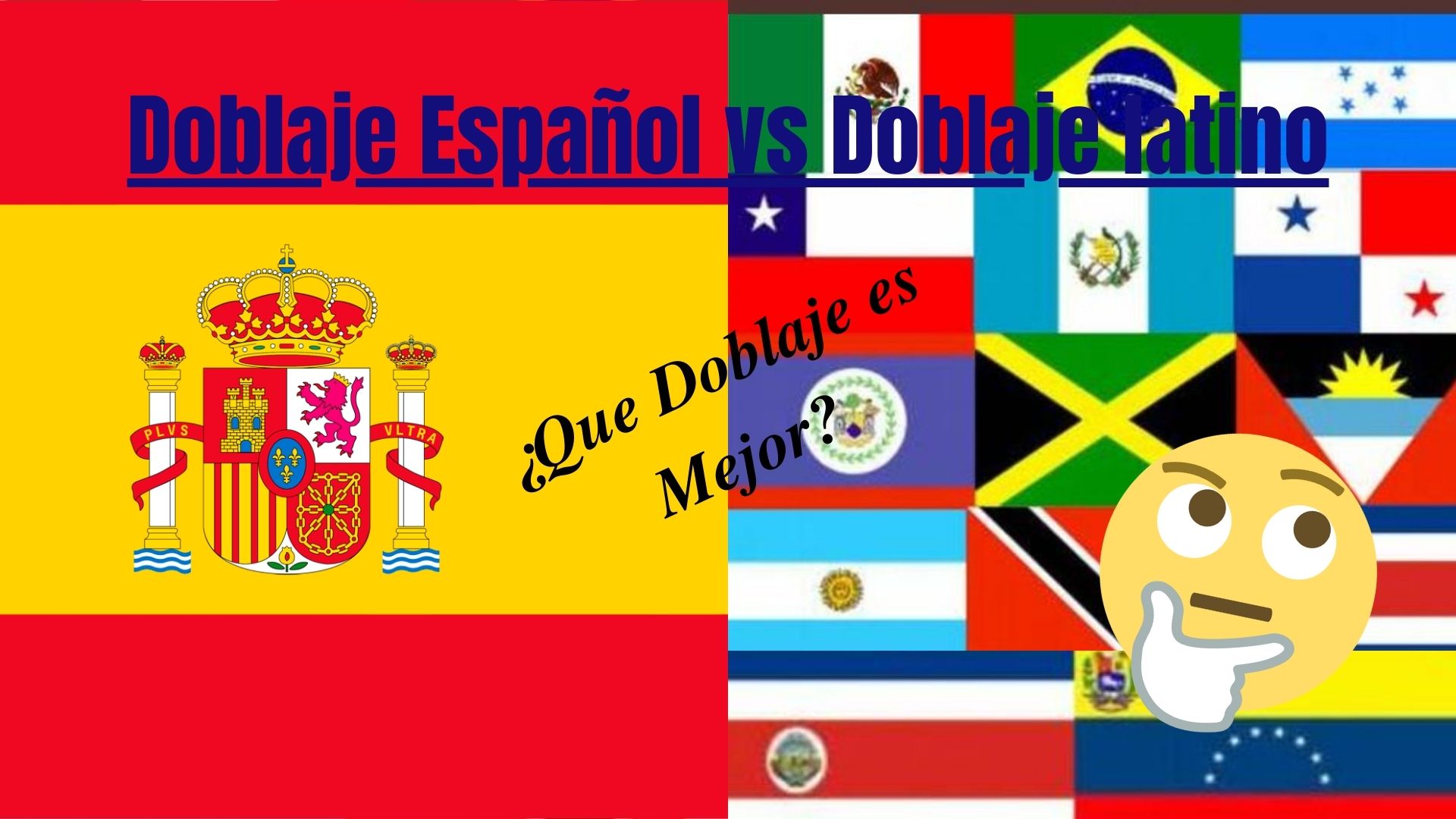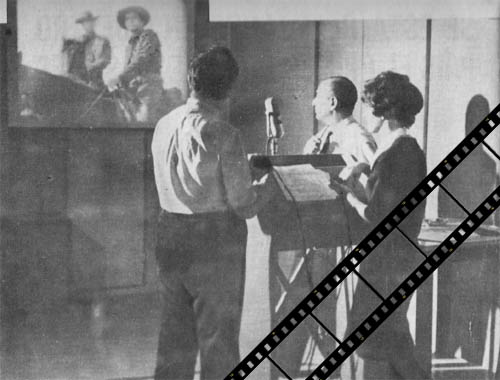[Esp-Eng] Doblaje Español vs Doblaje Latino ¿Cuál es mejor? / Spanish vs. Latino dubbing ¿Which is Best? By: @aletoalonewolf
hive-166847·@aletoalonewolf·
0.000 HBD[Esp-Eng] Doblaje Español vs Doblaje Latino ¿Cuál es mejor? / Spanish vs. Latino dubbing ¿Which is Best? By: @aletoalonewolf
 <center><sup><i>**Image created in** [**Canva**](https://www.canva.com/design/DAE99FGiEJI/h8HJzkJoI_o4Jy_uIxjOCg/edit?utm_content=DAE99FGiEJI&utm_campaign=designshare&utm_medium=link2&utm_source=sharebutton)</center> <div class="text-justify"> <div class="pull-left"> Conocemos al doblaje como aquel oficio que se encarga de traducir casi cualquier medio audiovisual para que este sea distribuido y comercializado en distintos países y así extender el mercado. Siendo el doblaje el Hispanohablante (Español y también Latinoamericano) quienes le ponen más empeño a este arte. Buscando analizar y comprobar que doblaje es mejor. ¿Alguna vez te preguntaste porque España a pesar de compartir el idioma con sus ex colonias tiene su propio doblaje? Pues la respuesta la veremos aquí... </div> </div> <div class="text-justify"> <div class="pull-right"> We know dubbing as the profession that is in charge of translating almost any audiovisual media so that it can be distributed and commercialized in different countries and thus extend the market. Being the Spanish-speaking dubbing (Spanish and Latin American) those who put more effort to this art. Looking to analyze and check which dubbing is better, have you ever wondered why Spain, despite sharing the language with its former colonies, has its own dubbing? Well, we will see the answer here... </div> </div> --- <center> **Origen del doblaje** </center>  <center>[***Source***](https://asgran.org/historia-del-cine-y-doblaje)</center> <div class="text-justify"> Los orígenes del doblaje se remontan a inicios de los años 30, con la llegada del cine sonoro. En el que muchos países europeos por cuestiones nacionalistas, políticas e incluso de hasta censura en algunos aspectos empezaron a utilizar este medio para que la población con poco conocimiento en otros idiomas pudiese comprender mejor las películas y sin contaminar el idioma con términos extranjeros o prestamos lingüísticos. Países como Alemania, Francia, Italia y España. Este último durante la dictadura Franquista adoptó el doblaje principalmente como medio de propaganda y de censura para incentivar la castellanización homogénea. En cuanto a Latinoamérica, surgió durante la 2da guerra mundial en plena “Edad de Oro” del cine Mexicano el cual era financiado principalmente por Hollywood. Estos primeros doblajes contenían una gran variedad de acentos de distintos países del continente, no fue sino hasta mediados de los 60´s donde se optó por un español neutro (inspirado principalmente en la Edad de Oro que lo vio nacer) para que así sonase mejor y lograr cubrir todo el mercado hispanohablante. Ambas costumbres de ambos doblajes se mantienen hasta nuestros días. </div> <div class="text-justify"> >*The origins of dubbing date back to the early 30's, with the arrival of sound films. In which many European countries, due to nationalist, political and even censorship issues in some aspects, began to use this medium so that the population with little knowledge of other languages could better understand the films and without contaminating the language with foreign terms or linguistic loans. Countries such as Germany, France, Italy and Spain. The latter, during the Franco dictatorship, adopted dubbing mainly as a means of propaganda and censorship to encourage homogeneous Castilianization. As for Latin America, it emerged during the Second World War in the middle of the "Golden Age" of Mexican cinema, which was mainly financed by Hollywood. These first dubbings contained a great variety of accents from different countries of the continent, it was not until the mid 60's when they opted for a neutral Spanish (inspired mainly by the Golden Age that saw its birth) and thus cover the entire Spanish-speaking market. Both customs of both dubbings are maintained to this day. * </div> --- <center> **¿Cuál Doblaje es Mejor?** </center> <div class="text-justify"> Es notoria la diferencia que existe entre el doblaje español y doblaje latino. Es entonces donde surge la pregunta ¿Cuál es mejor? el español utiliza palabras y términos propios de la región, siendo estos muy diferentes y extraños para el público latino. Teniendo incluso un doblaje especial para el público de habla catalana, catalana y gallega. En cuanto al otro, tiene buena entonación y se caracterizan por mejorar algunos diálogos y darle una buena entonación. Sumándole la no utilización de modismos para no confundir el espectador hispanohablante promedio. Aunque hay veces que los mexicanos ignoran esa regla, pro eso ya es un punto y aparte. </div> <div class="text-justify"> >*There is a notorious difference between Spanish and Latin dubbing. It is then where the question arises: Which is better? The Spanish dubbing uses words and terms from the region, which are very different and strange for the Latin audience. It even has a special dubbing for Catalan, Catalonian and Galician speaking audiences. As for the other, it has good intonation and is characterized by improving some dialogues and giving it a good intonation. In addition, they do not use idioms so as not to confuse the average Spanish-speaking viewer. Although there are times when Mexicans ignore this rule, but that's a point and a part.* </div> <div class="text-justify"> Al final es una respuesta subjetiva, debido a que ambos doblajes tienen elementos que los caracterizan y al final es el espectador quien decide. En base a con cual se siente más cómodo o con el que creció escuchando más. </div> <div class="text-justify"> >*In the end it is a subjective answer, because both dubs have elements that characterize them and in the end it is the viewer who decides. Based on which one he/she feels more comfortable with or the one he/she grew up listening to the most.* </div> --- <div class="text-justify"> y eso es todo por ahora, de verdad muchas gracias por leer. Como dije, mi intención no es generar algún tipo de polémica o debate, sino informar sobre el doblaje español y latino explicando sobre sus origenes y el porqué de lo que son en la actualidad. </div> <div class="text-justify"> *and that's all for now, thank you very much for reading. As I said, my intention is not to generate some kind of controversy or debate, but to inform about the Spanish and Latin dubbing explaining about their origins and why they are what they are today.* </div>  <center>Translated with www.DeepL.com/Translator (free version)</center> <center>**Fuentes**</center> <center>https://www.campustraining.es/noticias/doblaje-latino-vs-espanol/</center> <center>https://www.menzig.es/a/debate-doblaje-espanol-latino-castellano/</center>